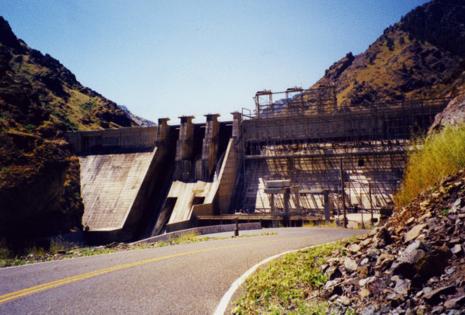Trump official, Idaho Republicans clash over Snake River dam removal
Published in News & Features
BOISE, Idaho — At a visit to a Nez Perce Hatchery near Lewiston, Robert F. Kennedy Jr. spoke of a future without dams on the Snake River.
The Nez Perce traditionally relied on salmon as a critical part of their diet, and the tribe for years has advocated for dams to be breached because they impede salmon migration to and from the ocean. On Thursday, Kennedy, the secretary of the Department of Health and Human Services, advocated for increased access to the tribes’ traditional foods, including salmon, The Lewiston Tribune reported.
His statements “suggested support” for breaching the dams, Idaho lawmakers said in a Friday news release. The proposal struck a nerve with Idaho Republican leaders, who have long opposed such a move. On Friday, they dug in their heels.
State Republican senators “firmly oppose any federal or regional effort to undermine Idaho’s water sovereignty, energy security or agricultural economy through dam removal,” they wrote. “The people of Idaho, not Washington, D.C., should decide the future of our water and infrastructure.”
It was a rare public disagreement between the state’s Republican lawmakers and a member of President Donald Trump’s administration. In the release, signed by Senate Pro Tem Kelly Anthon, R-Burley, and Sen. Ben Toews, R-Coeur d’Alene, lawmakers repeatedly expressed appreciation for Kennedy’s initiatives but said “it is clear that on the issue of dam removal, the people of Idaho speak with one voice: The dams must stay.”
Anthon and Toews did not respond to an email requesting comment. Emily Hilliard, a spokesperson for Kennedy, told the Statesman by email that he had “expressed his support for science-based efforts to restore the health of the river ecosystem.”
Kennedy framed the issue of Native American tribes’ access to traditional food as part of his campaign to “make America healthy again” by encouraging Americans to eat unprocessed foods, the Tribune reported. The Nez Perce’s lack of access to their traditional foods, including salmon, is part of an ongoing “genocide” by the U.S. government against Native Americans “with a food system that is actually poisoning the tribes” by relegating them to unhealthy, processed foods, he said at Thursday’s visit to the hatchery.
It was a position that appeared at odds with the rest of the Trump administration. In June, Trump canceled a deal that former President Joe Biden made with the Nez Perce that would have provided up to $1 billion for salmon recovery and studies intended to prepare for breaching the dams. That decision “halted a government-wide initiative to restore abundant salmon runs in the Columbia and Snake rivers and signaled an end to the government’s willingness to consider removing dams that blocked their free flow,” ProPublica reported.
In their Friday release, senate Republicans pushed back on the idea that dams on the Snake River were the main driver of declining salmon populations.
“The causes of fish population declines are complex and multifactorial,” they wrote. Those include increased predation, unfavorable ocean conditions and harvest, according to a 2024 Senate Joint Memorial, addressed to Biden, Congress and Idaho’s congressional delegation, which they cited in their release.
The dams offer significant economic and environmental benefits, the memorial argues: Wheat exports are barged through the Snake River dams, which offer a “fuel-efficient, environmentally friendly mode of transportation.” The dams also produce thousands of megawatts of hydropower. Breaching the dams, the memorial argues, “would inflict on Idaho citizens a loss in economic and trade opportunities” and a “threatened quality of life.”
Any effort to restore fish populations, lawmakers wrote in their release, “must be science-based, not politically driven.”
The National Oceanographic and Atmospheric Administration in 2022 found that breaching the dams on the Lower Snake River would be critical to restoring salmon populations.
“The science robustly supports” habitat restoration, dam removal and “ecosystem-based management,” the agency found. The dams turn nearly 150 miles of the Snake River into “a series of warm, shallow reservoirs that leave salmon vulnerable to birds and predatory invasive fish,” the Sierra Club, an environmental advocacy group, wrote in 2023. In warmer water, the fish are more susceptible to stress and disease.
Removing the dams, the Sierra Cub wrote, would “give the species a real shot.”
_____
©2025 Idaho Statesman. Visit at idahostatesman.com. Distributed by Tribune Content Agency, LLC.







Comments